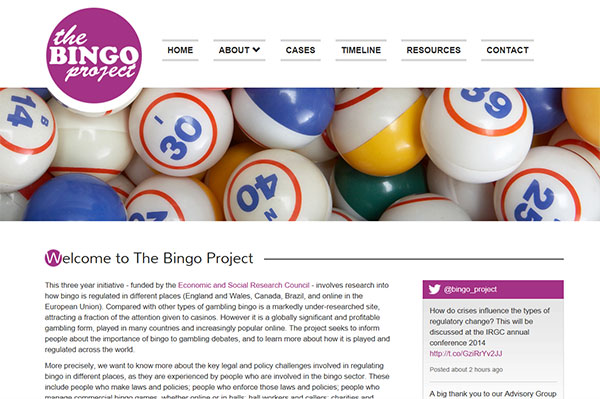A new website has been launched for a £0.5m Kent Law School research project that is reviewing the laws governing bingo across the globe.
The Bingo Project website highlights four major case studies in the UK, Canada, Brazil and the European Union (EU) that the team is researching for the project entitled A Full House: Developing a New Socio-Legal Theory of Gambling Regulation, funded by the Economic and Social Research Council.
Project leader Dr Kate Bedford said: ‘Bingo is a globally significant form of gambling, played by millions of people in many countries as well as online, yet it remains under-researched by academics exploring gambling law reform.’
‘We are seeking to inform people about the importance of bingo to gambling debates, and to learn more about how the game is played and regulated across the world.’
Dr Bedford is working with Research Associate Dr Oscar Alvarez-Macotela and Professor Toni Williams and is supported by a voluntary advisory board chaired by gambling policy expert Professor Gerda Reith.
The Bingo Project began last year by exploring the impact of recent changes made to UK gambling laws on the commercial and charitable bingo sectors in England and Wales. Dr Bedford and Dr Alvarez-Macotela have been engaged in extensive fieldwork up and down the country, interviewing councillors and visiting commercial bingo halls, social clubs and holiday parks.
Dr Bedford said: ‘We want to know more about the key legal and policy challenges involved in regulating bingo in different places, as they are experienced by people who are involved in the bingo sector. These include people who make laws and policies; people who enforce those laws and policies; people who manage commercial bingo games, whether online or in halls; hall workers and callers; charities and religious organisations that use bingo to fundraise; volunteers who work for those charities; people who run bingo in alternative forms (like drag bingo) and, of course, bingo players themselves.’
Over the course of the next two years the team will turn their attention overseas. In Canada, bingo can only be played in support of charitable causes (unless run by a province). The Bingo Project will be researching how hotly debated regulatory reforms impact different groups of people in British Colombia and Ontario where bingo can be an important source of revenue for charitable organisations.
In Brazil, where the President tried to outlaw the game in 2004, The Bingo Project will examine the reasons why the game was criminalised at a time when gambling restrictions were being lifted in other parts of the world.
Finally, in the EU, the research team will conduct a systematic review of the laws governing the online bingo sector which currently vary significantly across the 28 member states.
As the project develops, the team will make more and more of their academic and non-academic bingo-related research materials available to interested visitors via the website’s ‘Resources’ page. Various events will be held to discuss findings and the project will close with a conference in 2016.
The Gambling Commission, which regulates commercial gambling in the UK, is among the organisations represented on the project’s advisory board. Through their Licensing Authority Bulletin, they are encouraging key stakeholders in the gambling industry to get involved with the project by responding to a request to share experiences of bingo regulation with the project team.
For more information follow the project team on Twitter and anyone with a bingo story to tell can contact the team via their website(particularly if your story might help them to understand bingo better!)

